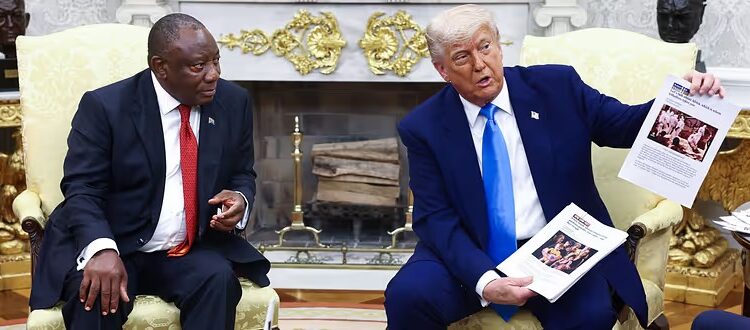A diplomatic meeting between US President Donald Trump and South African President Cyril Ramaphosa took a dramatic turn on Wednesday, after Trump blindsided his guest with a surprise presentation alleging a so-called “white genocide” in South Africa.
What began as a formal engagement in the Oval Office quickly descended into tension when Trump reportedly turned off the lights and played a provocative video. The footage included violent imagery and incendiary clips of controversial South African political figures, most notably Julius Malema, chanting “Shoot the Boer” — a song with a contentious history in South Africa.
According to sources present, Ramaphosa was visibly unsettled but responded with composure. He firmly rejected the narrative suggested by the video, stating that it represented extremist voices and not government policy. He emphasised that while crime in South Africa is a serious issue, it affects people of all races — and the overwhelming majority of victims are Black South Africans.
“There is criminality in our country,” Ramaphosa said. “People who do get killed, unfortunately, through criminal activity are not only white people; the majority of them are Black people.” He further highlighted the absurdity of the genocide accusation by pointing out that his delegation included his minister of agriculture, who is an Afrikaner.
The incident echoes a similar episode earlier this year when Trump used a meeting with Ukrainian President Volodymyr Zelenskyy to raise debunked allegations in front of the press. Diplomats and analysts are increasingly concerned that the US president’s confrontational tactics are damaging traditional channels of diplomacy.
Relations between Washington and Pretoria have deteriorated under Trump’s second term. Earlier this year, the US suspended some aid to South Africa and expelled its ambassador, citing concerns over property rights and rural security. The Trump administration also launched a controversial asylum scheme targeting white South Africans, which has drawn sharp criticism from the South African government.
This week’s ambush has heightened fears in Pretoria that Trump is using foreign policy encounters to bolster his domestic political base rather than to promote constructive international dialogue. Officials in Ramaphosa’s camp have described the meeting as “deeply unproductive” and suggested that the president would raise the issue with other US stakeholders in the coming days.
The broader implications of the encounter remain uncertain. For South Africa, the incident risks entrenching a perception that American diplomacy under Trump is erratic and polarising. For the US, it raises questions about its standing on the global stage and whether traditional allies can rely on respectful engagement from the White House.
Despite the tension, Ramaphosa stood firm, reiterating South Africa’s commitment to inclusivity and constitutional democracy. “We are a nation still healing from the wounds of apartheid,” he said. “But we do not promote hate — we are building something better.”
newshub finance




Recent Comments